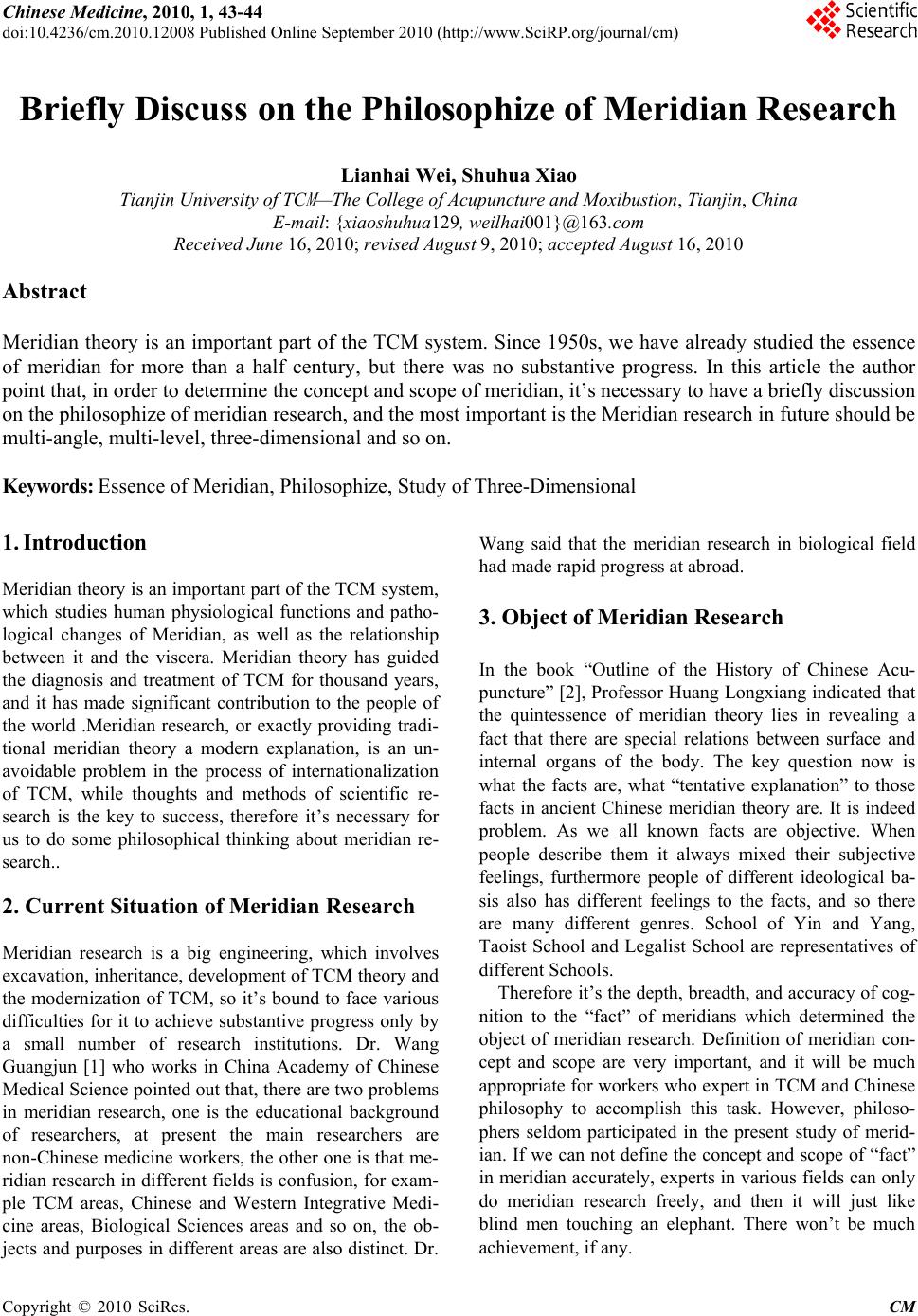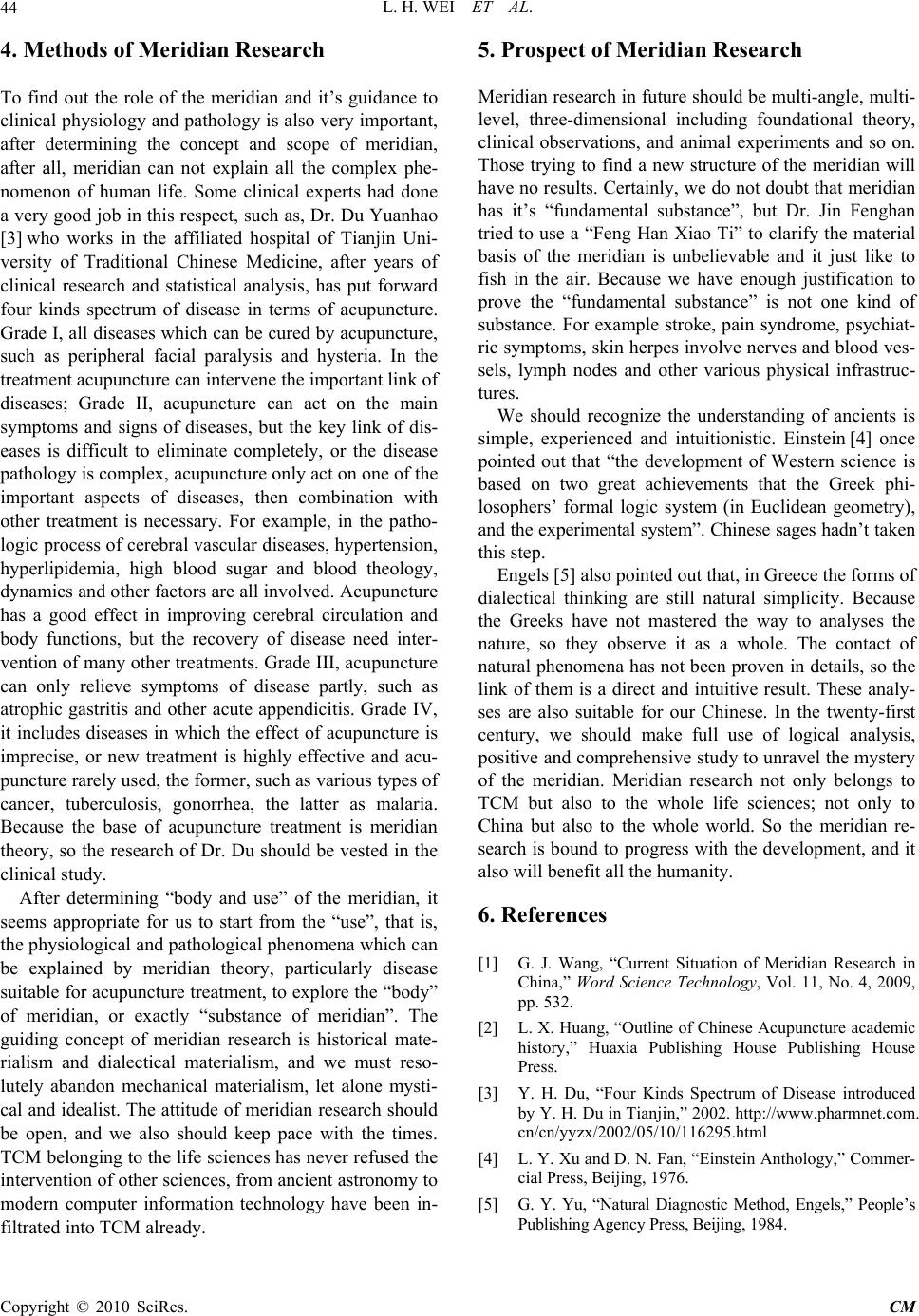Paper Menu >>
Journal Menu >>
 Chinese Medicine, 2010, 1, 43-44 doi:10.4236/cm.2010.12008 Published Online September 2010 (http://www.SciRP.org/journal/cm) Copyright © 2010 SciRes. CM Briefly Discuss on the Philosophize of Meridian Research Lianhai Wei, Shuhua Xiao Tianjin University of TC M —The College of Acupuncture and Moxibustion, Tianjin , China E-mail: {xiaoshuhua129, weilhai001}@163.com Received June 16, 2010; revised August 9, 2010; accepted August 16, 2010 Abstract Meridian theory is an important part of the TCM system. Since 1950s, we have already studied the essence of meridian for more than a half century, but there was no substantive progress. In this article the author point that, in order to determine the concept and scope of meridian, it’s necessary to have a briefly discussion on the philosophize of meridian research, and the most important is the Meridian research in future should be multi-angle, multi-level, three-dimensional and so on. Keywords: Essence of Meridian, Philosophize, Study of Three-Dimensional 1. Introduction Meridian theory is an important part of the TCM system, which studies human physiological functions and patho- logical changes of Meridian, as well as the relationship between it and the viscera. Meridian theory has guided the diagnosis and treatment of TCM for thousand years, and it has made significant contribution to the people of the world .Meridian research, or exactly providing tradi- tional meridian theory a modern explanation, is an un- avoidable problem in the process of internationalization of TCM, while thoughts and methods of scientific re- search is the key to success, therefore it’s necessary for us to do some philosophical thinking about meridian re- search.. 2. Current Situation of Meridian Research Meridian research is a big engineering, which involves excavation, inheritance, development of TCM theory and the modernization of TCM, so it’s bound to face various difficulties for it to achieve substantive progress only by a small number of research institutions. Dr. Wang Guangjun [1] who works in China Academy of Chinese Medical Science pointed out that, there are two problems in meridian research, one is the educational background of researchers, at present the main researchers are non-Chinese medicine workers, the other one is that me- ridian research in different fields is confusion, for exam- ple TCM areas, Chinese and Western Integrative Medi- cine areas, Biological Sciences areas and so on, the ob- jects and purposes in different areas are also distinct. Dr. Wang said that the meridian research in biological field had made rapid progress at abroad. 3. Object of Meridian Research In the book “Outline of the History of Chinese Acu- puncture” [2], Professor Huang Longxiang indicated that the quintessence of meridian theory lies in revealing a fact that there are special relations between surface and internal organs of the body. The key question now is what the facts are, what “tentative explanation” to those facts in ancient Chinese meridian theory are. It is indeed problem. As we all known facts are objective. When people describe them it always mixed their subjective feelings, furthermore people of different ideological ba- sis also has different feelings to the facts, and so there are many different genres. School of Yin and Yang, Taoist School and Legalist School are representatives of different Schools. Therefore it’s the depth, breadth, and accuracy of cog- nition to the “fact” of meridians which determined the object of meridian research. Definition of meridian con- cept and scope are very important, and it will be much appropriate for workers who expert in TCM and Chinese philosophy to accomplish this task. However, philoso- phers seldom participated in the present study of merid- ian. If we can not define the concept and scope of “fact” in meridian accurately, experts in various fields can only do meridian research freely, and then it will just like blind men touching an elephant. There won’t be much achievement, if any.  L. H. WEI ET AL. Copyright © 2010 SciRes. CM 44 4. Methods of Meridian Research To find out the role of the meridian and it’s guidance to clinical physiology and pathology is also very important, after determining the concept and scope of meridian, after all, meridian can not explain all the complex phe- nomenon of human life. Some clinical experts had done a very good job in this respect, such as, Dr. Du Yuanhao [3] who works in the affiliated hospital of Tianjin Uni- versity of Traditional Chinese Medicine, after years of clinical research and statistical analysis, has put forward four kinds spectrum of disease in terms of acupuncture. Grade I, all diseases which can be cured by acupuncture, such as peripheral facial paralysis and hysteria. In the treatment acupuncture can intervene the important link of diseases; Grade II, acupuncture can act on the main symptoms and signs of diseases, but the key link of dis- eases is difficult to eliminate completely, or the disease pathology is complex, acupuncture only act on one of the important aspects of diseases, then combination with other treatment is necessary. For example, in the patho- logic process of cerebral vascular diseases, hypertension, hyperlipidemia, high blood sugar and blood theology, dynamics and other factors are all involved. Acupuncture has a good effect in improving cerebral circulation and body functions, but the recovery of disease need inter- vention of many other treatments. Grade III, acupuncture can only relieve symptoms of disease partly, such as atrophic gastritis and other acute appendicitis. Grade IV, it includes diseases in which the effect of acupuncture is imprecise, or new treatment is highly effective and acu- puncture rarely used, the former, such as various types of cancer, tuberculosis, gonorrhea, the latter as malaria. Because the base of acupuncture treatment is meridian theory, so the research of Dr. Du should be vested in the clinical study. After determining “body and use” of the meridian, it seems appropriate for us to start from the “use”, that is, the physiological and pathological phenomena which can be explained by meridian theory, particularly disease suitable for acupuncture treatment, to explore the “body” of meridian, or exactly “substance of meridian”. The guiding concept of meridian research is historical mate- rialism and dialectical materialism, and we must reso- lutely abandon mechanical materialism, let alone mysti- cal and idealist. The attitude of meridian research should be open, and we also should keep pace with the times. TCM belonging to the life sciences has never refused the intervention of other sciences, from ancient astronomy to modern computer information technology have been in- filtrated into TCM already. 5. Prospect of Meridian Research Meridian research in future should be multi-angle, multi- level, three-dimensional including foundational theory, clinical observations, and animal experiments and so on. Those trying to find a new structure of the meridian will have no results. Certainly, we do not doubt that meridian has it’s “fundamental substance”, but Dr. Jin Fenghan tried to use a “Feng Han Xiao Ti” to clarify the material basis of the meridian is unbelievable and it just like to fish in the air. Because we have enough justification to prove the “fundamental substance” is not one kind of substance. For example stroke, pain syndrome, psychiat- ric symptoms, skin herpes involve nerves and blood ves- sels, lymph nodes and other various physical infrastruc- tures. We should recognize the understanding of ancients is simple, experienced and intuitionistic. Einstein [4] once pointed out that “the development of Western science is based on two great achievements that the Greek phi- losophers’ formal logic system (in Euclidean geometry), and the experimental system”. Chinese sages hadn’t taken this step. Engels [5] also pointed out that, in Greece the forms of dialectical thinking are still natural simplicity. Because the Greeks have not mastered the way to analyses the nature, so they observe it as a whole. The contact of natural phenomena has not been proven in details, so the link of them is a direct and intuitive result. These analy- ses are also suitable for our Chinese. In the twenty-first century, we should make full use of logical analysis, positive and comprehensive study to unravel the mystery of the meridian. Meridian research not only belongs to TCM but also to the whole life sciences; not only to China but also to the whole world. So the meridian re- search is bound to progress with the development, and it also will benefit all the humanity. 6. References [1] G. J. Wang, “Current Situation of Meridian Research in China,” Word Science Technology, Vol. 11, No. 4, 2009, pp. 532. [2] L. X. Huang, “Outline of Chinese Acupuncture academic history,” Huaxia Publishing House Publishing House Press. [3] Y. H. Du, “Four Kinds Spectrum of Disease introduced by Y. H. Du in Tianjin,” 2002. http://www.pharmnet.com. cn/cn/yyzx/2002/05/10/116295.html [4] L. Y. Xu and D. N. Fan, “Einstein Anthology,” Commer- cial Press, Beijing, 1976. [5] G. Y. Yu, “Natural Diagnostic Method, Engels,” People’s Publishing Agency Press, Beijing, 1984. |

